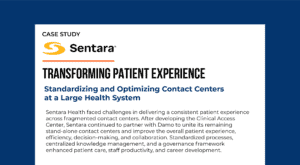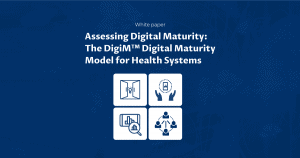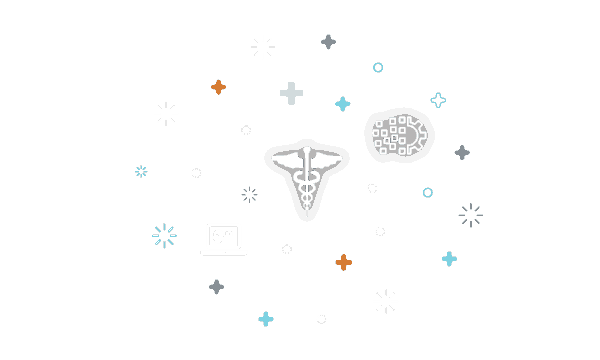Building the AI-Ready Health System: From Pilots to Autonomy

As health systems seek to reduce clinician burden, improve operational efficiency, and deliver more personalized care, many are turning to AI—not just for automation, but for true autonomy. In a recent episode of The Big Unlock podcast, Shekar Ramanathan, Executive Director of Digital Transformation at Atlantic Health System, joined hosts Rohit Mahajan, Managing Partner and CEO and Ritu M. Uberoy, Managing Partner at Damo to discuss his healthcare journey, the promise of generative AI, and the importance of grounding innovation in practical, patient-centered strategies. Shekar believes that healthcare is on the verge of a major shift toward agentic AI, where intelligent systems can operate semi-independently to support both clinicians and patients.
Listen to the full conversation
A Strategic Approach to AI: Outcomes First, Technology Second
Atlantic Health’s journey began with a clear principle – work backwards from the outcome. “Our AI strategy is really around building kind of the framework,” Shekar explained. “It’s enabling the business, it’s understanding where the technology is going so that we can really be in a position to fully leverage it. That’s setting up the right governance, that’s setting up the right processes to be able to monitor AI, to make sure that it’s the right solution.”
This strategic clarity has allowed Atlantic Health System to identify high-value use cases across clinical and operational domains – from ambient scribing that streamlines documentation to intelligent message routing that directs patient queries efficiently. Each project is assessed not just on feasibility but on alignment with broader organizational goals and clinician workflows.
From Pilots to Practice: Real-World AI at Atlantic Health
Atlantic Health’s AI journey has evolved from early pilots to enterprise-level deployments. One standout example is their use of virtual medical assistants, tools designed to support patient outreach and engagement, especially for populations with lower digital affinity.
“We’ve focused on things like a virtual MA, where we can actually have more of a quasi-agentic approach for outreach, for patient communication, helping them manage their care,” Shekar said. These AI-driven assistants play a critical role in Atlantic’s commitment to health equity, helping underserved and digitally disconnected populations take a more active role in managing their care.
Another focus area has been scaling AI responsibly, which brings its own challenges. As use cases expand, so does the need for workforce training, process alignment, and robust governance. “Scalability becomes a challenge,” Shekar noted. “And then finding the ability to really, who are the right people that are going to be able to use the tools? How are we going to be able to extract value and not get just excited by the art of the possible?”
To address this, Atlantic is investing in AI maturity models, education programs, and a center of excellence that promotes cross-functional learning and best practices.
Scaling AI with Strategic Governance
Atlantic Health System is actively scaling generative AI across departments—from imaging and administrative operations to clinical workflows. But Shekar emphasized that innovation alone isn’t enough. Success depends on executive alignment, strong change management, and a well-defined governance framework.
He shared, “It’s easy to fall into the trap of chasing exciting new tools. But we’ve learned to step back and ask: Where is the real value? How does it improve patient care or clinician satisfaction?” His team has been intentional about bringing in stakeholders early, prioritizing trust and clarity, and avoiding “AI for the sake of AI.” The health system’s AI governance council plays a key role in evaluating use cases, setting guardrails, and ensuring ethical implementation.
One area where AI has made a tangible impact is radiology. Atlantic Health has deployed AI tools to reduce turnaround times in image interpretation and improve workflow efficiency. These successes are encouraging—but they’ve also brought new challenges, such as integrating solutions into existing systems and training clinicians to trust and adopt new processes. “We’ve had to rethink not just the tech, but the operating model that supports it,” Shekar noted.
Health Equity and Patient Engagement in a Diverse Community
Serving a geographically and demographically diverse population across New Jersey, Atlantic Health System is especially focused on health equity and digital inclusion. Shekar pointed out that many patients who could benefit the most from digital tools are often the least likely to access them due to limited digital literacy or socioeconomic barriers.
“How do we make digital care accessible to those who aren’t asking for an app?” he asked. “We’re working on outreach, education, and reducing friction—meeting patients where they are, not where the technology is.” Whether it’s language preferences, mobile access, or community partnerships, the organization is exploring ways to make digital transformation truly inclusive.
Unlocking the Next Chapter: Autonomy in Care Delivery
Looking to the future, Shekar identified agentic AI—systems that can act autonomously or semi-autonomously—as the next major shift in healthcare technology. These intelligent agents will be able to take on routine tasks, assist in decision-making, and streamline workflows, potentially reducing the administrative burden that has long plagued clinicians.
“Providers have been asked to do more and more over the years. With agentic AI, we have an opportunity to offload repetitive tasks so that clinicians can focus on what matters most—direct patient care,” he said.
He also anticipates a convergence of traditional generative AI and agentic models, creating hybrid systems that are both context-aware and capable of executing actions. But he was quick to note that progress must be balanced with thoughtful oversight. “We’ve moved at a glacial pace for years, and now suddenly we’re ready to sprint. It’s critical that we stay conscious of outcomes, ethics, and user trust as we scale.”
A Pediatric-Centric Approach to AI
Pediatric healthcare comes with its own unique challenges—fewer available data points, smaller population sizes, and higher sensitivities around communication and consent. This makes the responsible use of AI even more critical.
Dr. Morse noted that solutions must be designed with children and families in mind, not simply adapted from adult care settings. Whether deploying ambient tools, summarizing clinical notes, or streamlining administrative workflows, every use case must prioritize trust, safety, and patient experience.





